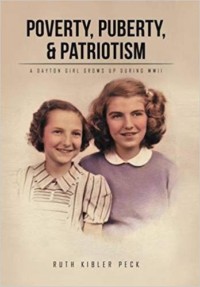Title: Poverty, Puberty and Patriotism
Author: Ruth Kibler Peck
Publisher: Toplink Publishing
ISBN: 978-1514487952
Pages: 86
Genre: Non-fiction, Memoir
Reviewed by: Susan Brown
Pacific Book Review
Poverty, Puberty and Patriotism is a memoir which captures a snapshot of a time in American history that brought the country together, uniting all Americans against a common enemy. When the United States entered World War II, the consequences were absorbed by the American public, once again. Many had thought World War I, The Great War, had put an end to war. Not so. The bombing of Pearl Harbor by the Japanese brought the U.S. into the conflict and called all Americans to a higher purpose. Author Ruth Kibler Peck notes: “There would be less of everything because our Number One job was to take care of our servicemen and provide everything they would need to win the war. It seemed the world had stopped for a while.”
As a seven-year-old, she observed and felt the impacts to her small family of the war, as her parents struggled also to regain their footing after the Great Depression. Her family, as well as most American families, saved newspapers, collected rubber for reuse, and grease for use in ammunition; took in a boarder, moved into smaller housing and scrimped and saved in every aspect of their life, all with the intent of helping the war effort. Sacrifice was a way-of-life and that feeling filled the days with the pride of “doing my part.”
The characteristics of life during the period between Pearl Harbor and VJ-Day in 1945 recounted by Ms. Peck shines a light on her efforts to navigate the day-to-day stress of a young woman going through puberty during a time when an enormous cloud hung over the country. Every day was a balancing act, trying to maintain an equilibrium between home, school and the impact of the “war.”
The optimism of the author as a young girl growing up with a safe, supportive family comes shining through on just about every page. This could quite easily be a pessimistic story of loss and misery and despair. But the author’s ability to look back to that time and see the positive effects it had on her life is inspiring. We see her love of school — the teachers, friends, homework, learning new things. She effusively states, “To me, school was a wonderful gift—a place to grow up, to make lots of friends, and become the best person I could possibly be.” We feel her joy at receiving $8 from her parents as a birthday present, knowing that their sacrifice to give this gift made it so much sweeter for her. We are touched by her gratitude for the tenderness of neighbors who generously helped her family when her mother was ill. And we are cheered by the description of her canoe ride in the eighth grade with her first boyfriend.
Embedded in this remembrance is also quite a bit of historical information, gleaned predominately from the author’s remembrance of radio and newspaper accounts. As the war unfolded, the author includes topical facts about communities affected by young people enlisting and leaving in droves, President Roosevelt’s missives to the country, as well as the disturbing reality of the first glimpse of what would come to be known as the Holocaust. Facts about war bonds and victory gardens share in the narrative that also includes particulars on the country’s changing culture as big bands, variety shows and movies became popular.
Poverty, Puberty and Patriotism is packed with compassion and jubilation and an overwhelming sense of patriotism. This memoir will renew your faith in the ability of all Americans to come together as one, united citizenry.


